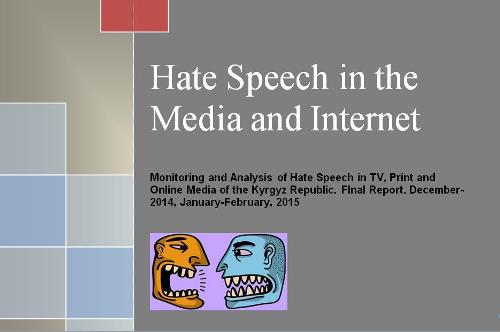15-04-2015, 00:00 Category: English, Reports & Researches, News
 School of Peacemaking and Media Technology supported by the Canada Fund
for Local Initiatives (CFLI) has completed the media monitoring report "Hate
Speech in the Media and Internet’.
School of Peacemaking and Media Technology supported by the Canada Fund
for Local Initiatives (CFLI) has completed the media monitoring report "Hate
Speech in the Media and Internet’.
The report is based on the analysis of hate content carried in the surveyed broadcasting, print, online media outlets and social networks of the Kyrgyz Republic. All surveyed media were examined for ethnic stereotypes and xenophobia
In December 2014, January and February 2015, we performed content analysis of 47 media outlets broadcasted and published in Kyrgyzstan in Kyrgyz and Russian languages, including 33 newspapers, 11 online media outlets, 2 TV channels, and 1 social media outlet. The media outlets were selected for analysis based on their popularity rating among the audience, availability and distribution in all the regions of the country. Current media monitoring contained some additional indicators such as focus-group interviews in border areas and in geographically compact minority communities.
Impact of social and political agenda on hate speech
In the period analyzed, less media texts and reports containing hate language and direct accusations that would directly call to discrimination against ethnic groups were found. However, intolerant expressions have been used widely in implicit forms with a hostile overtone. The ethnicity of people, hostile rhetoric on their backgrounds is still a lens showing the reaction to political, economic and social issues.
When some sensitive issues concerning such key figures as people or entities representing some ethnic group or a country are discussed in the political arena (parliament, government, etc.), the media immediately circulate stereotypical ad hominem attacks.
Experts have recorded the increasing number of ethnic groups facing hostile attacks. If earlier anti-Uzbek rhetoric has been recorded, now other ethnic groups have been added as targets of hate. More inhumane attacks and dehumanizing metaphors have been qualified against the Chinese, Russians, Koreans, Uigurs.
Anti-American and anti-Russian moods of journalists and politicians concerning the developments in Ukraine, future accession of Kyrgyzstan to EurAsEC can be clearly discerned, anti-Chinese moods intensify due to the increased migration flow from China to Kyrgyzstan.
In January-February 2015, almost all analyzed media outlets were writing in detail about the targets, tasks, provisions, and circulated the demands of Kyrk Choro Public Association with distinctive anti-ethnic rhetoric, described the incidents with their participation, thus attracting the attention of nationalistic part of the audience.
Some reporters have used "hate speech vocabulary” due to poor competencies. However, social consequences of the circulation of hate in media environment demonstrate that the society does have sufficient xenophobic attitudes, unjustified anxiety or ethnic hatred. For example, online forum and Facebook users have been active supporters of hate speech and xenophobic connotations.
Hate speech in public discourse
Retranslating stereotypes and hate speech in public discourse remain the major problem that negatively affects the audience and shapes public opinion. This type of hate speech is one of direct indicators of immature democratic society. Reporters have often carelessly quoted hate speech of different speakers, provided space in their media outlets for explicitly nationalist propaganda with no respective comments.
The studies in focus groups have shown that the tensions and animosity in the society can provoke such political speeches as, for example, the recent comment by T. Sarpashev, 1st Vice Prime Minister of the Kyrgyz Republic, at the meeting of Osh Regional Board. During his speech, the official compared Aravan and Karasu regions with Donetsk and Lugansk Regions of Ukraine, where military operations are on[1].
Quotes and transmission of hate and racial speech voiced at the meeting near the Bishkek-based American Embassy with participation of the representatives of "Russky Mir” and communists contained explicit examples of hate speech in the comment section[2].
The "Charlie Hebdo effect"
The monitoring of the extent of impact of hate speech on the audience in the first two months of 2015 showed the unexpected increase of fears of religious animosity.
It concerns more the response to the information coming outside Kyrgyzstan and spread by local media.
One third of respondents have read or heard from the media some information that, in their opinion, may cause animosity to other religious groups. Some fears are associated with the negative image of Muslims in the media due to the increasing radicalism in the region and the war in Syria. When assessing local content, some respondents referred to negative information provided by local media, which tells about the nationals of Kyrgyzstan taking part in the Syrian conflict and emphasizes their ethnic background pointing out that they are "Uzbeks and Tajiks”. This fact causes discontent and fear in representatives of these groups.
The examined viewers and readers referred to the impact of "the Charlie Hebdo effect”, which shaped their animosity towards the Christians. Such feelings appeared in the audience after the terror attack at the offices a French satirical magazine that has published controversial Muhammad cartoons. This topic widely discussed in foreign and local media has shocked many people. At the same time, readers pay attention to the existing satire and anecdotes in the Kyrgyz press that often contain xenophobic clichés and hostile lexemes, which can also cause animosity in various communities.[3]
A group of experts has developed a package of recommendations on how to facilitate better situation to prevent hate speech distribution in media and in public discourse, to control biases against minorities, and to prevent negative stereotypes related to them. However, elimination of hate speech in media should not encroach on the freedom of expression, including Internet freedom. Kyrgyzstan should seek to maintain its best rankings of the press freedom in Central Asia achieved in 2014[4].
About organization: School of Peacemaking and Media Technology in Central Asia is a nonprofit organization focused on media advocacy, researches and media development trainings.
A media monitoring group of the School of Peacemaking analyzed hate speech in media in 2010, 2011, 2012, 2013 and 2014.
[1] Meeting of Osh Regional Board as of February 2, 2015.
[2] Meeting at the Bishkek-based American Embassy, March 3, 2015
[3] Example from De-Facto newspaper
#1 as of 16.01.2015 Article "Кор саткандарга – To those who sell cemetery plots”, by Shailobek Duisheev, original heading in Kyrgyz.
[4] According to international organization Reporters Without Borders, Kyrgyzstan leads all other countries of Central Asia, and ranks #88. For comparison: Tajikistan ranks #116, Kazakhstan - #160,Uzbekistan -#166, Turkmenistan -#180.

The School of Peacemaking and Media Technology in Central Asia announces an annual competition among students from Kyrgyzstan, Kazakhstan,…

25 journalists and media workers from various regions of Kyrgyzstan have been trained to counter the propaganda of violent extremism and hate in…